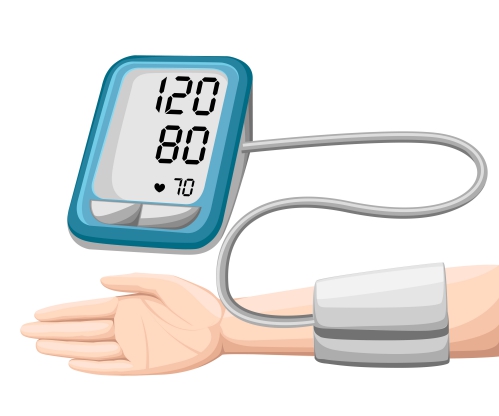High Blood Pressure (HBP), blood pressure, hypertension
Description : High blood pressure (hypertension) is when the pressure of blood inside blood vessels increases to
Article Details :
What is High blood pressure?
High blood pressure most known as hypertension is a problem where the pressure of blood inside blood vessels increases to harmful levels.
Blood pressure is the pressure exerted by the blood on the artery walls while the heart is pumping and it takes into account the amount of blood flowing through the arteries along with the resistance which blood meets.
When it increases to unhealthy levels, many organs of the body such as kidney, eyes, heart and brain will be affected but will do so in a progressive manner and symptoms may or may not appear initially. Just as too much water flowing inside a hose can lead to damaging effects, in the same way the arteries will be damaged when blood pressure is elevated.
High blood pressure is a treatable condition and therefore early detection is essential. Usually, several readings of blood pressure measurement over a number of days is required to make the diagnosis as there are many factors which can cause the blood pressure to be elevated momentarily and lead to a wrong diagnosis such as rushing to the consultation room, fear and anxiety.
The treatment of high blood pressure comprises of both healthy lifestyle modification and medications. Untreated conditions may progress to disastrous health issues such as stroke and heart attack.
Causes of hypertension
There are 2 types of hypertension, namely primary and secondary hypertension.
Primary hypertension
Primary hypertension is also known as essential hypertension. It is the most common form of hypertension. Till date no identifiable cause has been found but there are some factors which can contribute to the illness (In 95% of high blood pressure in the U.S the underlying causes cannot be found). These factors are:
- Age
- Race: in the U.S the risk for hypertension for African Americans is twice as much as for Caucasians.
- Diet: high amount of salt in food will increase the risk for hypertension
- Obesity
- Stress: in a state of stress the body releases hormones (for example adrenaline and cortisol) which increases the blood pressure by causing the heart to beat faster and blood vessels to narrow.
- Lack of physical activity
- Genes: gene mutations or genetic abnormality inherited from parents
Secondary hypertension
The term secondary hypertension is usually used when a direct cause for hypertension can be identified. It can be more deleterious than primary hypertension and often occurs quickly. Causes of secondary hypertension are:
- Kidney disease
- Obstructive sleep apnoea
- Thyroid diseases
- Chronic alcohol use
- Substance abuse
- Congenital heart defects
- Side effects of drugs
- Adrenal gland diseases: small gland that sits on top on the kidneys
- Birth control pills: especially those containing oestrogen
- Smoking
- Pregnant women
- Salty food
Signs and symptoms of hypertension
Most of the time people will not have any symptoms unless the blood pressure is extremely elevated. It takes several years to develop a disease severe enough to cause obvious symptoms. Severe hypertension symptoms include the following:
- Headache
- Nose bleeds
- Dizziness
- Flushing
- Shortness of breath
- Chest pain
- Blood in urine
- Visual changes
- Nausea and vomiting
- Severe anxiety
- Seizures
- Confusion
- Irregular heartbeat
- Fatigue
These symptoms will not appear in everyone but when they do, prompt medical attention is required as it can be fatal. That is why blood pressure measurements are routinely taken at the doctor’s office to detect hypertension earliest possible. People having a family history of high blood pressure, heart diseases or any other factors that might lead to hypertension are advised to check their blood pressure at least twice per year.
Diagnosis of high blood pressure
The most useful tool to diagnose high blood pressure is by taking a blood pressure reading. At the doctor’s office blood pressure is routinely taken however if ever the blood pressure is elevated, additional measurements will have to be taken over the course of several days. That is because several environmental factors can increase blood pressure, such as stress caused by being in the doctor’s office (white coat effect) or having rushed to the office (this is why it is recommended that a patient waits comfortably for at least 5 minutes before having his/her blood pressure measurement taken). In addition, blood pressure changes throughout the day and do not stay constant.
To rule out any other conditions, more tests will be prescribed by the physician. These tests include:
- Urinalysis
- Electrocardiogram (ECG or EKG)
- Cholesterol test
- Echography of the heart and kidney
These tests will help the doctor to either identify the causes for the hypertension or to evaluate the toll of hypertension on the organs. In the meantime, treatment will be started by the doctor and lifestyle modifications advised.



